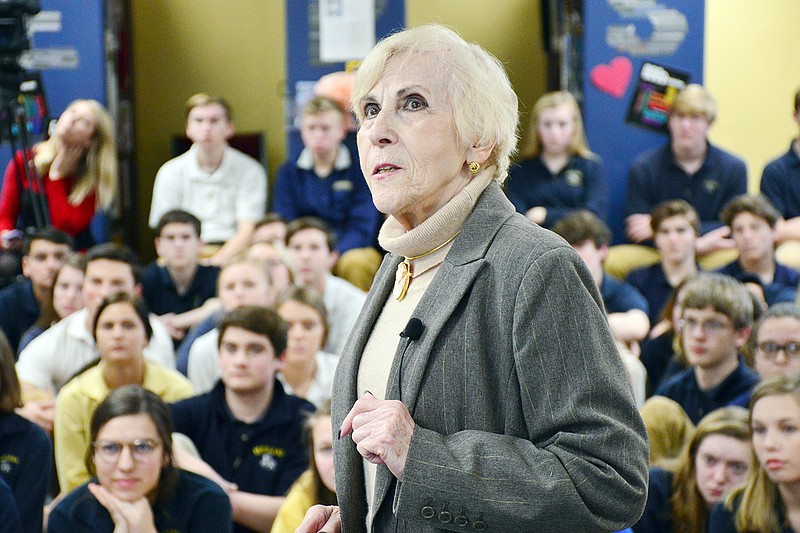It's not easy for Rachel Miller to tell her family's story from the Holocaust, but she said it is a pleasure to see people interested in hearing it - because to share her story is one of the reasons she survived when many other members of her family did not.
Miller, 85, of the St. Louis area, was born in France as the youngest of the four children of her Polish Jewish parents, Nathan and Helen. She spoke to Helias Catholic High School students Wednesday.
This is the sixth year Helias has invited a Holocaust survivor to come speak at the school. English teacher Sarah Kempker first invited Ben Fainer to speak to students in 2013. Sophomores read Elie Wiesel's "Night," the memoir of the late Romanian-born Jewish writer, philanthropist and Holocaust survivor who chronicled his experiences at the Auschwitz-Birkenau death camp.
Fainer has since passed away, but one of his daughters, Sharon Berry, introduced Miller to students and staff in Helias' library Wednesday and shared her own family's story. Berry is the co-founder of the Hannah Ida Urman Foundation - named after her grandmother, Ben Fainer's mother - and the foundation made Miller's presence at Helias possible.
Kempker said more than 1,000 Helias students have been able to hear from a survivor like Fainer or Miller over the past six years.
Miller said she did have a happy childhood, though her family had downgraded from a home in Warsaw, Poland, to a two-room apartment in Paris without running water when they arrived in France in 1932.
She remembered being terrified, though, when conquering Nazi German soldiers paraded into Paris in 1940. The French government collaborated with the Nazis - though there was a resistance movement that included members of Miller's family.
Her father was picked up in their apartment building's courtyard on Aug. 23, 1941, and eventually taken to a jail where he was lethally injected with poison Dec. 30.
"My house was so quiet after my father died," Miller said.
The rest of her family was picked up for deportation to a death camp in July 1942. Miller escaped because her mother had sent her away as a 9-year-old to live under an assumed name with a non-Jewish farmer.
She then went on to live with an aunt but had to wear the yellow Star of David badge that publicly marked her as a Jew and signified for people that "we had no right to exist."
Her mother and sister, Sabine, likely were sent to be gassed to death as soon as they arrived by rail at Auschwitz - indicated through the records the Nazis kept that do not show a cause of death for them. Her brothers, Henri and Adolphe, were selected for forced labor, and they could have died in any number of ways - none of which were probably the official causes of death listed in their documents.
"They opened up a medical book, and they put whatever sounded good on the death certificate," Miller said.
She survived by changing identities and hiding in different places. She ended up at an orphanage, where after the war, three U.S. soldiers offered to bring her home with them. She did make it to the United States, though the soldier who brought her as an 11-year-old repeatedly molested her.
"I feel it's important," Miller said of why she tells her story even though it's difficult, painful. "I never (used to feel) that way, but as I got older, I seemed to feel that one of the reasons I survived was for me to stand here and tell my story to young people - not just young people, to people - to tell them what happened. I was there. I saw it happen. I did not read it. It happened to me. I feel it's important, and I hope to God that I can do it as long as I can, and I will do it as long as I can, with God's help," she added.
"I'm very worried about that," she said of whether and how the history of the Holocaust will be preserved in coming decades once the remaining survivors die of old age.
"The reason I worry about that is because today, with digital technology, you can change anything you want, and unfortunately, there will be people that will," she added. "And God knows what's going to happen 30 years from now. I know there are some that are descendants that speak for their family, but it's not the same as seeing a survivor."
What can someone do if they're confronted with a Holocaust denier?
"All you can do is listen and say you met a Holocaust survivor," then walk away, she said.

